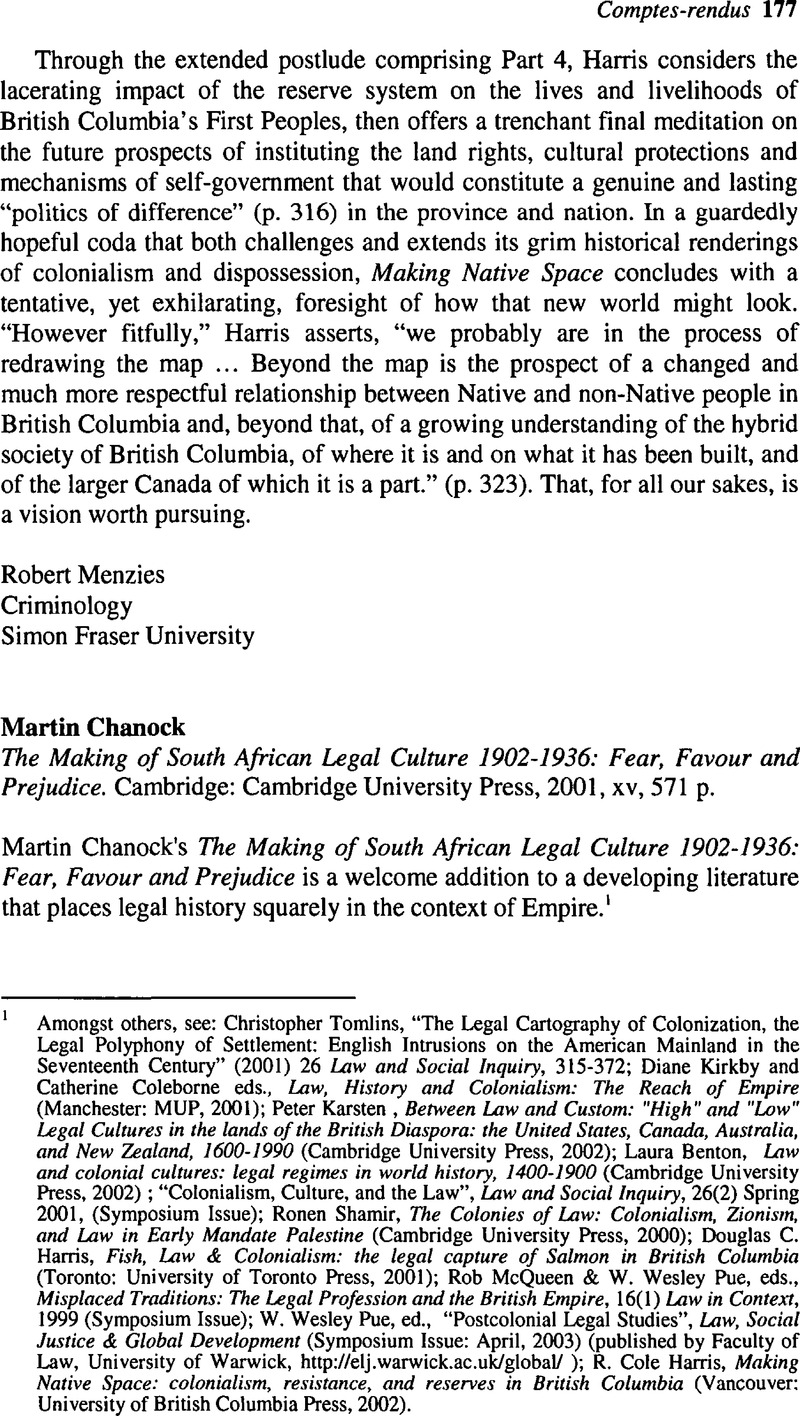No CrossRef data available.
Published online by Cambridge University Press: 18 July 2014

1 Amongst others, see: Tomlins, Christopher, “The Legal Cartography of Colonization, the Legal Polyphony of Settlement: English Intrusions on the American Mainland in the Seventeenth Century” (2001) 26 Law and Social Inquiry, 315–372CrossRefGoogle Scholar; Kirkby, Diane and Coleborne, Catherine eds., Law, History and Colonialism: The Reach of Empire (Manchester: MUP, 2001)Google Scholar; Karsten, Peter, Between Law and Custom: “High” and “Low” Legal Cultures in the lands of the British Diaspora: the United States, Canada, Australia, and New Zealand, 1600–1990 (Cambridge University Press, 2002)Google Scholar; Benton, Laura, Law and colonial cultures: legal regimes in world history, 1400–1900 (Cambridge University Press, 2002)Google Scholar; “Colonialism, Culture, and the Law”, Law and Social Inquiry, 26(2) Spring 2001, (Symposium Issue); Shamir, Ronen, The Colonies of Law: Colonialism, Zionism, and Law in Early Mandate Palestine (Cambridge University Press, 2000)Google Scholar; Harris, Douglas C., Fish, Law & Colonialism: the legal capture of Salmon in British Columbia (Toronto: University of Toronto Press, 2001)CrossRefGoogle Scholar; McQueen, Rob & Pue, W. Wesley, eds., Misplaced Traditions: The Legal Profession and the British Empire, 16(1) Law in Context, 1999Google Scholar (Symposium Issue); Pue, W. Wesley, éd., “Postcolonial Legal Studies”, Law, Social Justice & Global Development (Symposium Issue: April, 2003)Google Scholar (published by Faculty of Law, University of Warwick, http://elj.warwick.ac.uk/global/); Harris, R. Cole, Making Native Space: colonialism, resistance, and reserves in British Columbia (Vancouver: University of British Columbia Press, 2002).Google Scholar
2 Egs., Pue, W. Wesley & Sugarman, David, eds., Lawyers and Vampires: Cultural Histories of Legal Professions (Oxford: Hart Publishing, 2003)Google Scholar; McQueen, Rob & Pue, W. Wesley, eds., Misplaced Traditions: British Lawyers, Colonial Peoples (1999) 16:1Law in Context (Symposium Issue).Google Scholar
3 The literatures are immense but each of these fields is well represented in most issues of Australian Feminist Law Journal, amongst others.
4 See Duncanson, Ian, “Close Your Eyes and Think of England” (1997) 3 Canberra Law Review 123–38.Google Scholar Literatures on state formation or internal colonization in the United Kingdom or other obviously non-colonized places are richly suggestive in this context.
5 Much recent literature has presented some such understanding of both the attainment and the limits of liberal governance. The legal profession turned out to be a significant fulcrum point in the workings out of these tendencies in at least some societies. See, for example, W. Wesley Pue, “Cultural Projects and Structural Transformation in the Canadian Legal Profession” in Lawyers and Vampires supra note 1 and literatures cited therein. Chunn, Dorothy, McLaren, John, & Menzies, Robert, eds., Regulating Lives: Historical Essays on the State, Society, the Individual, and the Law (Vancouver: University of British Columbia Press, 2002).Google Scholar